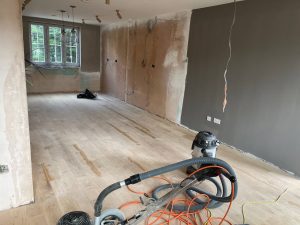
Preparing your home for floor sanding is a crucial step to ensure a smooth and successful project. Proper preparation not only makes the process more efficient but also helps protect your belongings and enhance the final result. Here’s a detailed guide on how to prepare your London home for floor sanding.
- Clear the Room
Remove Furniture and Rugs:
- Take out all furniture, rugs, and decorative items from the room. This provides a clear working space and prevents any damage to your belongings.
Take Down Curtains and Wall Hangings:
- Remove curtains, drapes, and any wall hangings to protect them from dust and potential damage.
Empty Closets and Cabinets:
- If you have built-in closets or cabinets with wooden floors, empty them to ensure the entire floor area can be accessed.
- Clean the Floor Thoroughly

Sweep and Vacuum:
- Thoroughly sweep and vacuum the floor to remove dirt, dust, and debris. This helps the sanding equipment work more effectively and prevents scratches.
Mop the Floor:
- Use a damp mop to clean the floor. Avoid soaking the wood, as excess moisture can damage it. Allow the floor to dry completely before sanding.
- Check for Protruding Nails and Screws
Inspect the Floor:
- Carefully inspect the floor for any protruding nails, screws, or staples. These can damage the sanding equipment and create uneven results.
Hammer Down Nails:
- Use a hammer to nail down any protruding nails. Ensure they are slightly below the surface of the wood to avoid damaging the sander.
Remove Staples and Screws:
- Use pliers to remove any staples or screws that are sticking out of the floor.
- Seal Off the Area
Prevent Dust Spread:
- Sanding creates a significant amount of dust. Seal off the room by closing doors and covering doorways with plastic sheets. Use painter’s tape to secure the plastic sheeting.
Cover Vents and Ducts:
- Cover air vents and ducts with plastic to prevent dust from spreading throughout your home’s HVAC system.
- Plan for Noise and Disruption
Inform Neighbours:
- Floor sanding can be noisy. Inform your neighbours about the project, especially if you live in a terraced or semi-detached house, to maintain good relations.
Consider Temporary Relocation:
- If possible, arrange to stay elsewhere during the sanding process to avoid noise and dust. This is especially important if you have small children or pets.
- Prepare for Waste Disposal
Dust Collection:
- Ensure that the sanding equipment you use or hire has an efficient dust collection system. This will minimize the mess and make cleanup easier.
Plan for Waste Removal:
- Have a plan for disposing of the dust and debris generated during sanding. Use heavy-duty trash bags and consider renting a skip if you expect a large amount of waste.
- Protect Adjacent Areas
Cover Adjacent Flooring:
- Protect any adjacent flooring, such as carpets or tiles, by covering them with plastic sheets or drop cloths.
Shield Walls and Baseboards:
- Use painter’s tape to cover the edges of baseboards and lower parts of walls to protect them from dust and accidental damage.
Conclusion
Properly preparing your home for floor sanding can make a significant difference in the efficiency and outcome of the project. By following these steps, you can protect your belongings, minimize dust and disruption, and ensure a smooth, successful sanding process.
Taking the time to prepare adequately will result in beautifully sanded floors that enhance the look and value of your London home. Whether you’re doing it yourself or hiring professionals, these preparation tips will help you achieve the best possible results. Enjoy the transformation and the renewed beauty of your wooden floors.

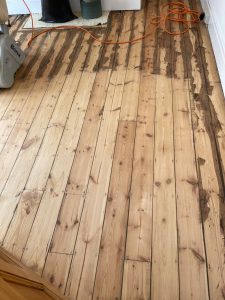

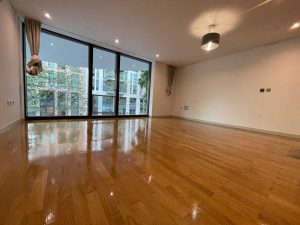
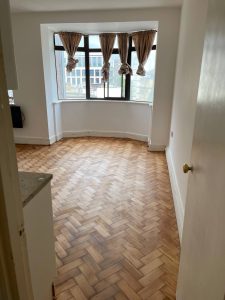
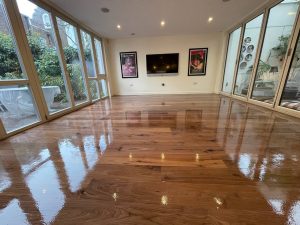
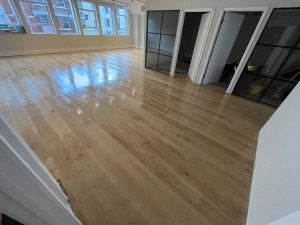
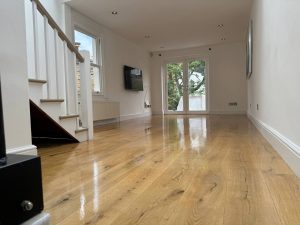
Eco-Friendly Floor Sanding: Sustainable Practices for Your Home
As environmental awareness continues to grow, many homeowners in London are seeking ways to make[Read more...]
Customer Testimonials: Real Stories of Floor Sanding Success
Hearing from satisfied customers is one of the best ways to understand the value and[Read more...]
Wood Floor Maintenance
[Read more...]
The Benefits of Floor Sanding for Pet Owners
The Benefits of Floor Sanding for Pet Owners As a pet owner, maintaining beautiful[Read more...]
Floor Sanding for Commercial Properties: What You Need to Know
Floor sanding is not only essential for residential spaces but also plays a crucial role[Read more...]
The Best Floor Sanding Practices for Winter
The Best Floor Sanding Practices for Winter Winter can present unique challenges for maintaining[Read more...]
How to Create Custom Floor Designs with Sanding and Staining
How to Create Custom Floor Designs with Sanding and Staining Transform your London home[Read more...]
How to Restore the Natural Beauty of Your Wood Floors
How to Restore the Natural Beauty of Your Wood Floors Revive and Maintain Your[Read more...]
DIY Floor Sanding: Pros, Cons, and Tips
Floor sanding is a crucial step in restoring and maintaining the beauty of your wooden[Read more...]
How Floor Sanding Can Transform Your London Home
Living in London comes with the charm of historic architecture and classic interiors. However, maintaining[Read more...]